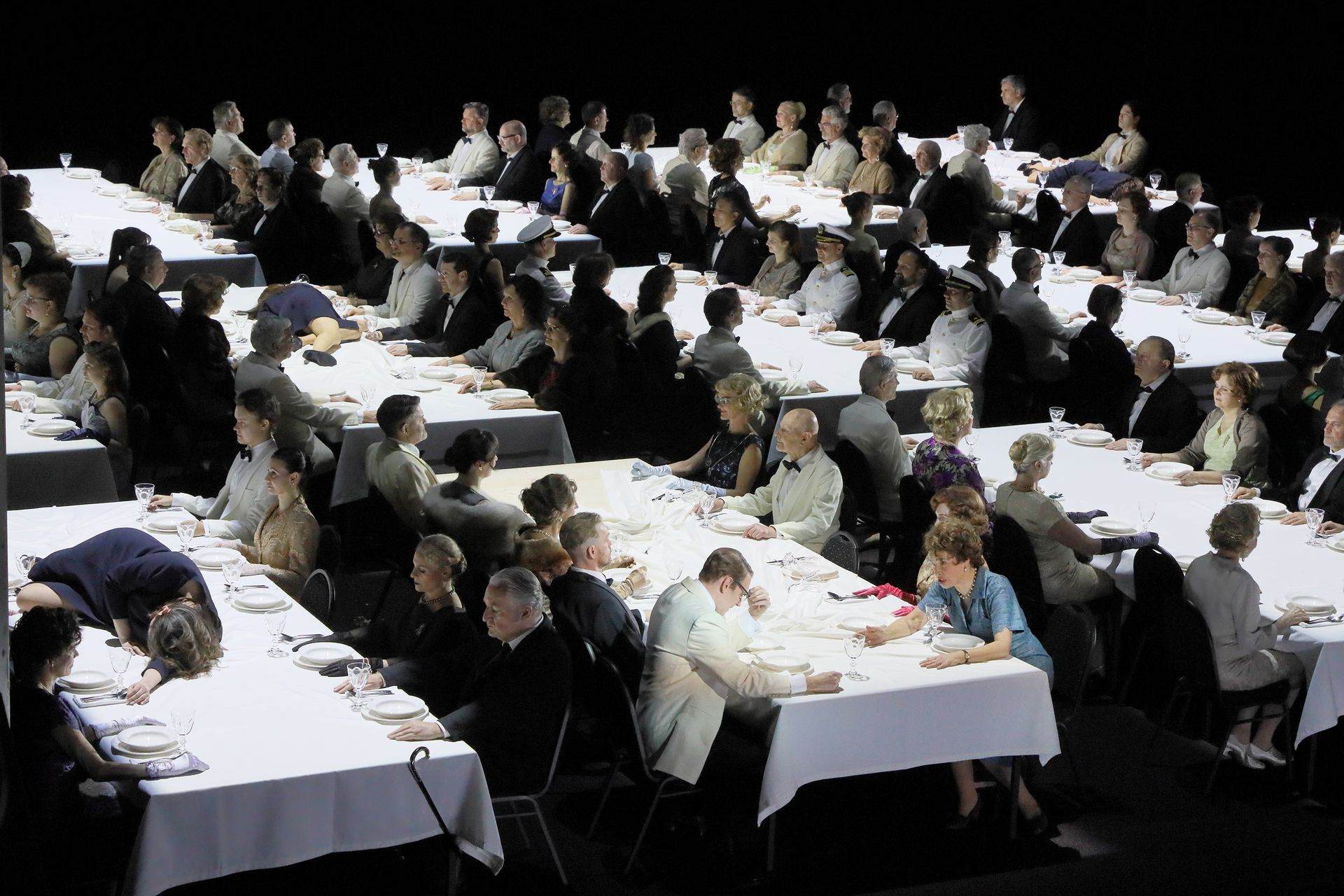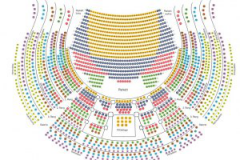The Passenger
Mo | Tu | We | Th | Fr | Sa | Su |
The plot spans two time periods: The frame story is set on a transatlantic ocean liner around 1959 / 60; flashbacks lead to the Auschwitz concentration and extermination camp in 1943 / 44. In the new Munich production, the action is expanded at the beginning to include a third time level set in the present day.
FIRST ACT
THE TRANSIT
Lisa is a passenger on a cruise ship. Together with her husband Walter, a German diplomat, she crosses the Atlantic. Both are happy to leave their homeland Germany and the past of the war years behind them. The emigration to South America should be the start of a time of new beginnings. Shortly after the journey begins, however, the marriage idyll ends: Lisa thinks she recognizes Marta, a former inmate of the Auschwitz concentration and extermination camp, in one of the passengers. Lisa was also in Auschwitz – as a member of the SS and a guard. Up to this point, Lisa has kept her crimes in the concentration camp a secret from Walter. The two get into an argument, but reconcile when a steward reassures them both that the mysterious woman Lisa thought she recognized as Marta is British, not Polish. Nevertheless, Lisa is increasingly overtaken by memories: memories of the head warden and the other SS men; of the inmates of the camp with their stories of suffering and their hopes; but most of all of Marta herself. The two share a complex history of dependence and humiliation. What happened between them catches up with Lisa. A confrontation with her past becomes unavoidable.
SECOND ACT
CLOSE TO DEATH
Lisa‘s experience oscillates between the events on board and her memories of the death camp: the Auschwitz camp commandant wants Tadeusz, a famous musician interned there, to play his favorite waltz for him. During the concert preparations, Tadeusz meets his fiancée Marta again for the first time. Lisa grants them a forbidden moment of togetherness and demands gratitude for her courtesies. She proposes to organize further rendezvous and thus wants to become a kind of protégée of Marta and Tadeusz, who are to become completely submissive to her. Tadeusz insists on his autonomy and self-determination – at the risk of not seeing Marta again. Meanwhile, the murder continues: the camp inmates confront the Auschwitz extermination machine with moments of mutual empathy, but are unable to escape death. The brutality and perfidiousness of the camp are brought to Lisa‘s full con-sciousness. The steward has to recant his information: the mysterious passenger is Polish after all. She could be Marta. An evening dance on board overlaps with the concert in the concentration camp: Tadeusz commits an act of resistance in front of the camp commandant. Instead of the requested waltz, he begins to play Johann Sebastian Bach‘s Chaconne. Tadeusz is murdered. Marta addresses the afterworld: "When your voices have disappeared one day, then we will all perish." Lisa is not granted redemption.
Program and cast
In German, Polish, Czech, Yiddish, French and English with surtitles in German and English. New production.
Duration approximately 2 hours 40 minutes
Conductor: Vladimir Jurowski
Production: Tobias Kratzer
Set Design: Rainer Sellmaier
Lighting: Michael Bauer
Video: Jonas Dah, lManuel Braun
Choruses: Christoph Heil
Dramaturgy: Christopher Warmuth
old Lisa: Sibylle Maria Dordel
Lisa: Sophie Koch
Walter: Charles Workman
Marta: Elena Tsallagova
Tadeusz: Jacques Imbrailo
Krystina: Daria Proszek
Vlasta: Lotte Betts-Dean
Hannah: Noa Beinart
Bronka: Larissa Diadkova
Yvette: Evgeniya Sotnikova
1st SS man: Bálint Szabó
2nd SS man: Roman Chabaranok
3rd SS man: Gideon Poppe
Senior Passenger: Martin Snell
Supervisor / Kapo: Sophie Wendt
Steward: Lukhanyo Bele
Bayerisches Staatsorchester
Chorus of the Bayerische Staatsoper
National Theatre Munich
The National Theatre Munich (German: Nationaltheater München) is an opera house in Max-Joseph-Platz in Munich, Germany. It is the home of the Bavarian State Opera and the Bayerisches Staatsballett(Bavarian State Ballet).
The Bavarian State Opera also performs in the Prinzregententheater, which opened in 1901 and, like the Bayreuth Festspielhaus, is built to Richard Wagner's specifications, and in the Cuvilliés Theatre at the Residenz, constructed in 1751–1753 and described by Thierry Beauvert as "a Rococo gem".
The Nationaltheater is very easy to get to both by car and by MVV public transportation.
By MVV public transportation
S-Bahn: S 1 - 8 Marienplatz
U-Bahn: U 3, 6 Marienplatz, U 3 - 6 Odeonsplatz
Bus: 52, 131 Marienplatz, 100 Odeonsplatz
Straßenbahn: 19 Nationaltheater
On the day of the performance, holders of regular tickets are entitled to use public transport provided by the Münchner Verkehrsverbund (MVV). This service starts at 3 pm respectively three hours before the performance commences and ends with the closing hour of the MVV.
By Car
Take the Altstadt-Ring to Maximilianstraße.
Parking garage Max-Joseph-Platz: open Monday to Sunday from 6:00 A.M. to 2:00 A.M.
You can take advantage of the special theatre parking fee of Euro 10,- from 6:00 P.M. to 8:00 A.M. by presenting your admission tickets.

 EN
EN DE
DE IT
IT FR
FR ES
ES RU
RU JP
JP RO
RO
 Seating plan
Seating plan 
